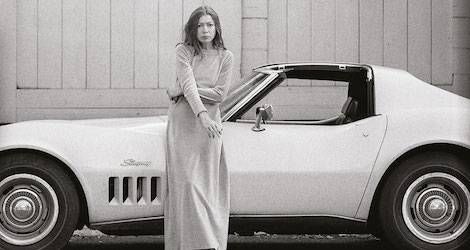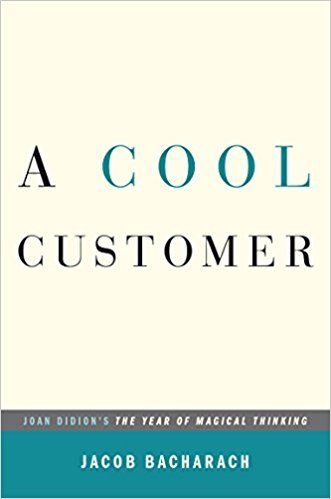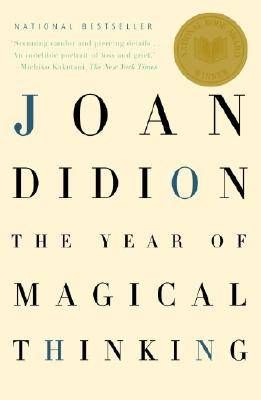
All the Drugs Combined: Jacob Bacharach on Joan Didion
Matthew Gallaway is the author of #gods and The Metropolis Case, which was praised by the New York Times for being “driven by exuberance and morbidity, fatalism and erotic energy.” He lives in the Washington Heights neighborhood of New York City with his partner and four cats. Previously he worked as a record-store clerk while earning a law degree from NYU and was a member of the indie rock band Saturnine. Follow on Twitter @matthewgallaway.

Can you tell me about the “hole in the universe that was filled by The Year of Magical Thinking” and how it prompted you to write this book?
I read an article—one of those annoying lists of supposedly “untranslatable” foreign words—a few years ago that mentioned a Finnish word that meant, roughly, “a feeling of intense homesickness for a place you’ve never visited.” And I think that’s what The Year of Magical Thinking was to me: what were we missing without knowing that we were missing it, until it appears to us out of the mist like some kind of Brigadoon. For me, that was very much the personal experience of coming to The Year of Magical Thinking, which I talk about explicitly in the earliest sections of A Cool Customer.
What are some of the parallels between Joan Didion and yourself?
For one, I think we are both products of mythical landscapes: the myths of frontier California and the myths of industrial Western Pennsylvania are very different, but both persisted long beyond any moment of historical truth—if, in fact, that history was ever quite true.
And beyond that—this is the source of the title of my book—we have both inherited and cultivated an affectation of coolness and managerial competence, to some degree a product of our innate temperaments, I’m sure, but also a result of our class, our education, and our calculated self-presentation. This is, I think, one reason why I responded so powerfully to TYOMT; the dislocating effect of a loved one’s illness and death on people who are habituated to having precise control not only of their external material and social circumstances, but of their own interior selves, is maybe even more jarring than it is for others, because it strips us of this central part of our identity and self-conception.
As the book continues, the narration increasingly blurs (in a good way) the lines between her story and yours. Did you anticipate this process or was it a function of writing the book? And does this relate to the idea that The Year of Magical Thinking is a “blueprint for grief and self-discovery that anyone can follow”?
I did not. I always intended to include elements of biography or memoir, but I think I first conceived the book as having a more formal division between the parts about Didion and the parts about me and my family. That’s probably reflected more in the earlier parts of the book. But as I wrote, I found that it wasn’t possible to maintain that separation of the two streams. They had to mingle, in large part because my own critical response to TYOMT was mediated by my own family history, in particular my brother’s death at an early age.
I love the idea of a blueprint for grief and self-discovery, although—slight digression—I’ve learned in my non-writer professional life that most people have a really fucking hard time reading blueprints. In retrospect, I might make a more specific comparison and say that I think of TYOMT, and A Cool Customer as its companion, as something more akin to a legend, the bit that tells you what all the otherwise incomprehensible symbols on the blueprint represent.
Geographical place plays a big part in Joan Didion’s work; can you talk a little about what Pittsburgh means to yours? (My mother, who grew up in Boston but has lived in Pittsburgh for 60+ years, always describes how perplexed she was after learning that there are always at least two routes to get anywhere in Pittsburgh, which made me smile a little when I was reading page 88).
Haha, yes, although you know, the other thing about travelling around Pittsburgh is that we have the expression, “You can’t get there from here.”
I’ve lived in this part of the country for almost all of my life, and so, although I’ve been privileged to travel relatively widely, my life and memory have been intensely shaped by my relationship to this place, the way its geography has dictated the development of communities and neighborhoods, the fact that there really are multiple routes from one place to another. This is probably more prominent in my fiction, actually—my novels are intensely descriptive of the geography of Western Pennsylvania, but it still matters in A Cool Customer. In the passage you mention, for instance, I have to decide how to drive back to my parent’s house, which is not an easy thing when you’ve just learned—quite literally minutes ago—that your twenty-six-year-old brother is dead.
Ironically—since it is also a book about Joan Didion—A Cool Customer actually ends in California.
Finishing your book, I was struck by the idea that the language many of us use to describe death and grief is vague and imprecise, and that you’ve attempted to give the words more nuance depending on exactly what we’re talking about (death as a universal concept versus death as a set of idiosyncratic circumstances, death as something that happens someone else versus “being dead” as something that happens to us as we consider the person who’s gone). Do you see this imprecision having implications—political, cultural—for our society as you see it evolving/devolving in 2018?
There’s a line I remember from a poem—I want to attribute it to Adrienne Rich, though that’s probably wrong, and I’m going to butcher it—that says something to the effect of: if we don’t know what words mean, how can we know what they have the power to conceal? And I think this does have implications for us; we are, after all, an exceedingly violent society, both in our domestic life and our militant posture abroad. There’s an imprecision in the way we talk about death and the dead that distracts from death’s ultimate finality and causes us to treat it, on the one hand as a mere inconvenience and on the other as a shameful embarrassment. Death surrounds us though, and it is—whatever dreams of immortality the goons out in Silicon Valley think to the contrary—the single, universal, ineradicable condition of human existence. So while I’m all for a degree of euphemism to comfort the grieving and afflicted, I think, at the same time, that we need to be able to name the thing both in its general existence as well as in the particulars of each human ending.
Can you discuss how grief is (and is not) a form of addiction? I especially loved the line that grief is like “all the drugs combined.”
Well, what is the difference between a recreational drug user and an addict? A recreational user is a seeker after a particular sensation—maybe that’s a rush of pleasure; maybe it’s just feeling stoned and giggly; maybe it’s to experience some momentary sense of expanded consciousness and perception. But addiction is the pursuit of sensation beyond all capacity to produce a particularized experience—an “intensity of experience” is the phrase I used. It’s a pursuit beyond reason, beyond calculation, beyond cost-benefit analysis, beyond sense. It’s a sort of mise en abyme in which the object is reflected infinitely in every direction and lost in its own self-repetition.
And that, to me, is what grief is like. It takes the sensation of particular emotions—to feel sad, to feel angry, to feel love or joy or frustration or confusion—which are particular responses, and it turns them into a chronic condition in which feeling becomes indistinct and moments become hard to separate from each other.
It is unlike addiction in that it is—usually—naturally limited in duration. It has a certain course that it runs. That’s not to say that we cease to be sad, occasionally bereft, even long after someone has died, but rather that there’s a degree of truth to the idea that grieving itself is a process with a beginning and an end, whereas addiction is usually self-perpetuating without some deliberate and willful act. There are, of course, some people who can’t stop grieving, and there, grief maybe is a more literal kind of addiction.
You say denial as “the central subject of Didion’s oeuvre.” Can you say a little bit about what you mean by this, and how—in Didion’s (and your) work—denial is possibly a good (or at least necessary) part of life?
We’re so used to treating “denial”—the pop-philosophical idea of it—as an innately bad thing that we never stop to think how utterly necessary it is for us to live in this world. A banal example: no one would ever get into a car and drive if not for a deep-seated denial about how absurdly dangerous it is for barely trained humans to zoom about at seventy miles per hour in ton-and-a-half, self-propelled missiles made of metal and glass.
Life is just terribly precarious. We are fragile, accident-prone, susceptible to disease and injury. To live, to love our partners and children, to go out the front door in the morning, requires a degree of ignoring the rattlesnake in the tall grass, as Didion might put it.
Do you think there’s anything about Joan Didion/TYOMT that speaks to you as a gay man (to the extent that sort of thing can be separated)?
Oh, God, I’m so glad you asked this. Yes! Didion is so camp! She’s treated as such a priestess of cool, a sort of avatar of literary sophistication, but then she writes lines like, “We are here on this island in the middle of the Pacific in lieu of filing for divorce.” It’s a great line, but gurl! For me, as a gay man, it’s that tension, between her true and obvious sophistication and her winking insertion of almost soap-opera melodrama, that makes her such an interesting figure. In the recent documentary that her nephew, Griffin Dunne, did for Netflix, he asks her what she thought when she was hanging in Haight-Ashbury and saw a young child high on LSD, and she gets this sly smile and says, shamelessly, “It was gold!” Which is what I would say if I were playing a drag version of her.
You describe yourself as an atheist but there seems to be a lot of faith (for lack of a better word) throughout the book; the need for belief to process trauma, the metaphor of an idea (or need) being the “soul” of a book, and so on. Do you see grieving as a kind of “religious” or “mystical” experience” (again, for lack of better terms)? Or another way to put it: has your brother’s death reshaped your beliefs? And did The Year of Magical Thinking play a part in this?
For one, I think the distinction between “religion” and “belief” is different for Jews—that’s partly the result of our own historical conception of peoplehood, and partly the result of learning the hard way through all the pogroms and through the Holocaust that at the end of the day gentiles don’t actually give a shit whether you believe that Hashem spoke to Moses out of the burning bush or not. So I think you’ll find a lot of atheists who still identify as Jews and who still retain a certain Jewish spiritual sensibility even as they doubt or disbelieve the existence of an actual and specific deity.
That said, the word I would use is neither “religious” nor “mystical” but rather ritual. Starting from the idea that grief is a process, what is ritual but the material process of the spirit? And ritual is important. Joan Didion mentions the Episcopalian graveside liturgy: “In the midst of life we are in death.” For me, it’s the saying of the Mourner’s Kaddish every year at my brother’s Yahrtzeit, even if “His [God’s] name,” which is to be “most blessed and magnified,” is to me only a cultural inheritance.
I’m not sure that either my brother’s death or TYOMT reshaped my beliefs, but I think they both occurred in my life during a period of reshaping of belief, a softening of the much harder atheism of my youth. It may be fair to say that they were not causal but were a catalytic ingredient in the reaction.












